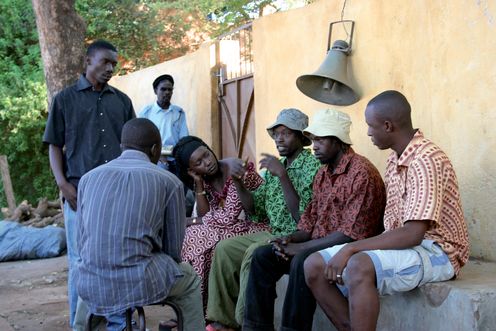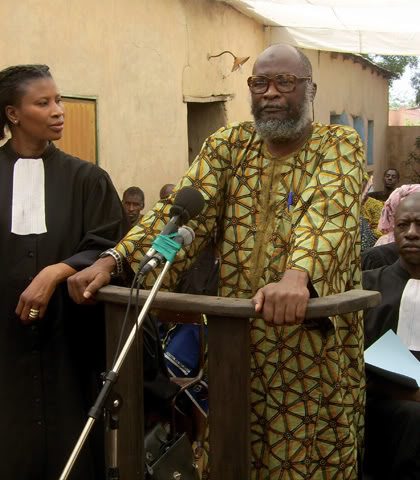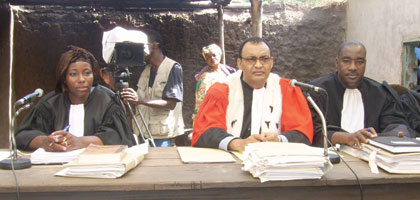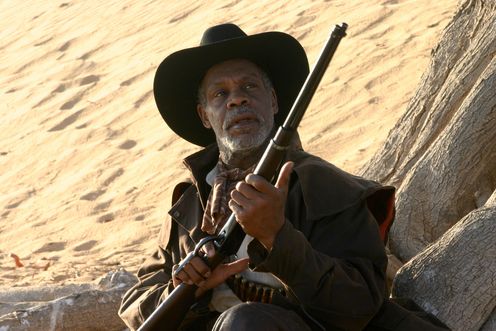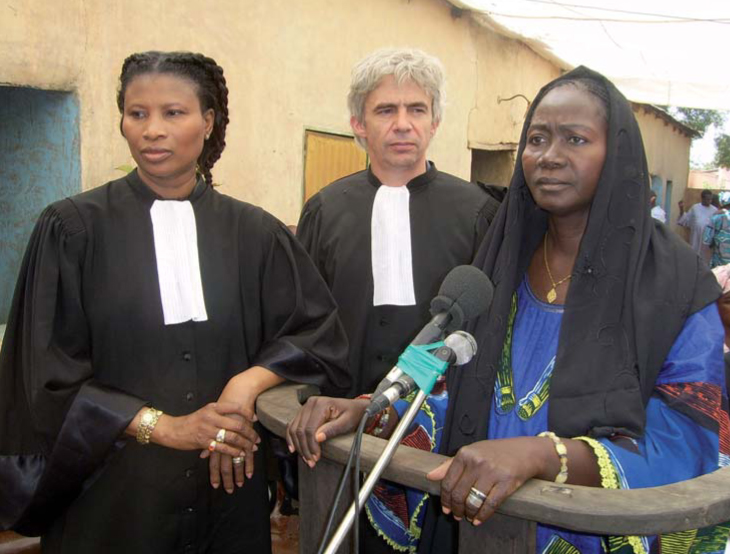From the Chicago Reader (March 9, 2007). — J.R.
BAMAKO ****
DIRECTED AND WRITTEN BY ABDERRAHMANE SISSAKO | WITH AISSA MAIGA, TIECOURA TRAORE, HELENE DIARRA, ROLAND RAPPAPORT, AMINATA DRAMANE TRAORE, DANNY GLOVER, AND ELIA SULEIMAN
Before the main title of Abderrahmane Sissako’s startling new feature appears, an elderly farmer arrives at a hearing that’s being held in a shared backyard in a poor section of Bamako, the capital of Mali. He’s there to testify, but when he steps up to the microphone he’s told politely to remove his hat and wait his turn.
What’s on trial in this backyard court is globalization, particularly the high-interest loans of such organizations as the World Bank and the International Monetary Fund and the pressure they put on governments to cut costs by privatizing or ending social services and firing workers. Unlike the seemingly random everyday details that surround the mock trial — small talk, the performances of a pop singer in a club, the illness of the singer’s daughter, a wedding, clothes being dyed or hung out to dry — this public reckoning is obviously staged. A year before he began filming, Sissako hired the judge, prosecutors, and defense attorneys, real lawyers who wrote their own dialogue, mainly in French (we’re often reminded that Mali is a former colony of France). Sissako hired the witnesses, who also wrote their own speeches, during or shortly before shooting, whenever he happened to find them. “Victims in Africa don’t need inventing,” he said in a recent interview in Sight & Sound. “Just go out on the street and they’re there.”
One of these witnesses, Aminata Traore, a writer and formerly the Malian minister of culture, is especially eloquent. “I strongly oppose the idea that Africa’s main characteristic is its poverty,” she says. “Africa is rather the victim of its wealth. I’d rather speak about pauperization than poverty. . . . Everything today can be bought or sold. A sick woman in a village risks dying because the nurse with the medicine won’t treat her if she can’t pay. This is what it’s come to, what we’ve learned from the system: pay or die. That’s the West’s lesson that we inflict on ourselves.” Some of Traore’s arguments are cogently countered by Roland Rappaport, a white defense lawyer who quarrels with some of her figures as well as with her implication that the World Bank wants Africans to starve.
As with the powerful ending of Ousmane Sembene’s Senegalese Black Girl 40 years ago, some of the silences are every bit as eloquent as the words. One witness, a schoolteacher, can’t bring himself to say anything at all, and the effect is just as devastating as the testimony of a laid-off worker forced to emigrate illegally under nightmarish conditions.
When the elderly farmer from the film’s beginning finally gets his turn, his angry, chanting lament in his native dialect lasts for three minutes. Sissako, who recently said that the man is an improviser who usually sings in rich metaphors for at least an hour, explained his decision not to subtitle it: “It’s a scream from the heart that doesn’t need to be translated.”
One reason Bamako feels like a blast of sanity is that the theoretical debates about the state of the world, particularly Africa and more particularly Mali, are only half of its agenda. The other half, broadly speaking, is the life of everyday Africans. Some of those in attendance pay close attention to the debates, but many are distracted, bored, or indifferent. And some of their activities figure as witty counterpoint to the hearings, as when Rappaport tries on sunglasses being hawked by a salesman during a recess.
The closest thing to a plot involves the pop singer and her increasingly estranged husband, who appears to be unemployed, but their relationship is portrayed mainly through drifting moods and glancing details. There’s also a parodic slice of the televised entertainment some characters are watching — a pastiche of an Italian western called Death in Timbuktu, with mean-spirited hombres played by, among others, Danny Glover (one of Bamako’s executive producers) and Palestinian filmmaker Elia Suleiman (Chronicle of a Disappearance, Divine Intervention).
Sissako somehow manages to reconcile the passionate words of the debate and the mundane activities surrounding it, but he seems most interested in noting and even marveling at the subtle comedy of their coexistence. He’s not offering simpleminded polemics, and he’s not offering solutions to the problems raised, though he is giving us a deeper understanding of them. As ambitious in its way as Sembene in his 1992 Guelwaar, which is also concerned with the consequences of neocolonial corruption in Africa, Sissako wants to make us more aware of the contradictions as well as the continuities between theoretical debates and everyday life.


